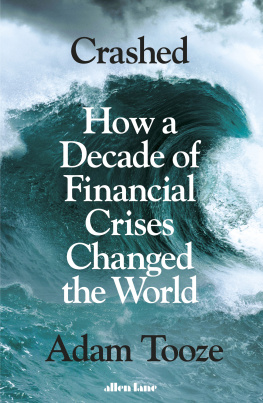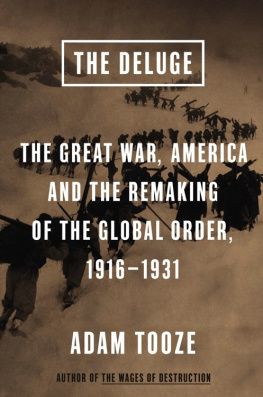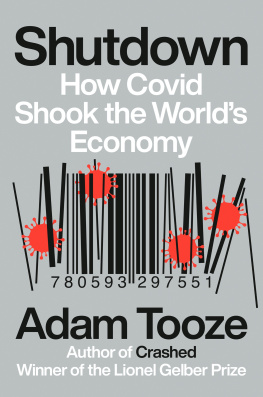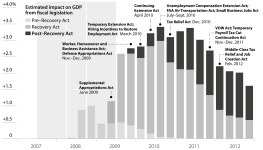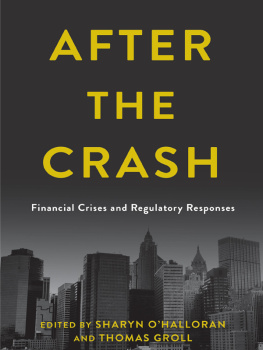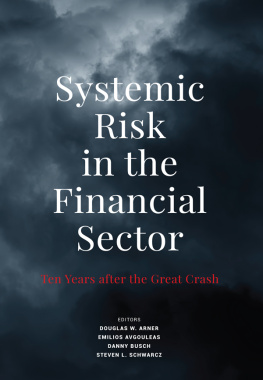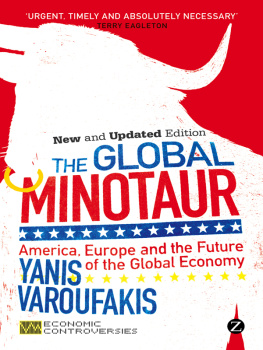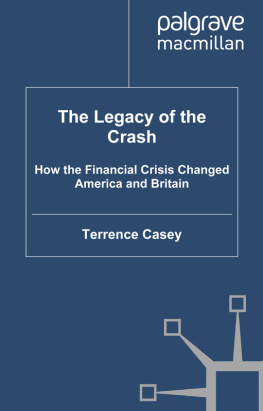Adam Tooze
CRASHED
How a Decade of Financial Crises Changed the World

ALLEN LANE
UK | USA | Canada | Ireland | Australia
India | New Zealand | South Africa
Allen Lane is part of the Penguin Random House group of companies whose addresses can be found at global.penguinrandomhouse.com.
First published in the United States of America by Viking, an imprint of Penguin Random House LLC 2018
First published in Great Britain by Allen Lane 2018
Copyright Adam Tooze, 2018
The moral right of the author has been asserted
Cover image: John Lund, Getty Images
Cover design: Richard Green
ISBN: 978-0-241-01193-5
For Dana
Acknowledgments
This book was written with urgency and I am deeply grateful to those who have made it happen. Working with Sarah Chalfant and the Wylie Agency has been as smooth as ever. My editors Simon Winder and Wendy Wolf collaborated enthusiastically on the project. Melanie Tortoroli gave invaluable advice on early drafts. It is their work and that of the production team at Viking and Penguin that have carried this book across the line.
In getting the manuscript into shape I relied heavily on the careful editorial attention of Nick Monaco, Kevin James Schilling and Ella Plaut Taranto.
The project took shape as an undergraduate course taught at Yale and Columbia, where my teaching fellows included Ted Fertik, Gabe Winnant, Nick Mulder, Madeline Woker, David Lerer and Noelle Tutur. I am enormously grateful to all of them.
In addition, from an early stage, the manuscript was read and commented on by Ted Fertik, Grey Anderson, Stefan Eich, Anusar Farooqui, Nick Mulder, Hans Knundani and Nicholas Monaco. Wolfgang Proissel, Barnaby Raine and Dana Conley added their comments to particular chapters. These friends and interlocutors know individually and collectively how much I owe to them.
Pieces I cowrote with Stefan Eich and Danilo Scholz helped to further sharpen the argument.
In connection with the book I benefited enormously from conversations with an array of colleagues, witnesses and participants in the drama described here.
As part of the research I was privileged to interview Mario Monti, Giuliano Amato, Timothy Geithner and Giulio Tremonti. I am extremely grateful for the time they devoted to our conversations.
Through my role as director of the European Institute at Columbia I have been fortunate to try out arguments with Frans Timmermans, Pierre Moscovici, Pierre Vimont, Marco Buti and Moreno Bertoldi.
Franois Carrel-Billiard is my indispensable collaborator at the institute. It is a privilege to work with him.
Nathan Sheets and Patricia Mosser, veterans of the Fed, gave generously of their time.
Erik Berglof helped me to think through the East European crisis.
A dinner with Mervyn King arranged by Peter Garber proved very illuminating.
Perry Mehrling, Brad Setser, Mike Pyle, Clara Mattei, Martin Sandbu, Nicolas Vron, Cornel Ban, Gabriella Gabor, Shahin Valle and Eric Monnet all offered invaluable input.
As ever, my old friends David Edgerton and Chris Clark provided an indispensable sounding board.
I have been fortunate to try the arguments of the book at workshops, conferences and seminars hosted in Berlin courtesy of the Hamburg Stiftung fr Sozialgeschichte, at the Heidelberg Center for American Studies, the American Academy Berlin, Brown University, Stanford, the Eisenberg Institute University of Michigan, the European University Institute, NYU Florence, the New School, UCLA, the MaxPo conference, the German Historical Institute Paris, the FPLH workshop in London, as part of the Science Po public debt project and at the NYU Kandersteg workshop. I am grateful both to my hosts and other participants at all these events.
A memorial conference for Francesca Carnevali in Birmingham heard a version of the argument about Europes banks.
Presenting to a seminar of the Siemens Stiftung moderated by Knut Borchardt and attended by Jrgen Habermas was a particular honor.
Beyond the formal academy I have been extraordinarily fortunate to fall in with a brilliant and deeply informed crowd on Twitter and Facebook who have changed my understanding of how an intense, real-time debate can develop in the twenty-first century.
In the trajectory of my work this project marks a double departure. I have moved forward in time into the field of contemporary history. At the same time I have moved backward to reengage with a youthful preoccupation with economics. This double movement has reminded me of debts I owe to two teachers.
Alan Milward, my doctoral supervisor, was a brilliant but difficult man. Given my personal makeup, the engagement with him was particularly high risk. But I survived and Alan remains a towering figure in the field of modern European history. I dont know whether he would have agreed with my take on the eurozone crisis, but I feel Alans presence.
Wynne Godley was a mentor and teacher of a very different kind. Spontaneously warm and generous in spirit, he took me under his cape in my first year at Kings and introduced me, and a group of my contemporaries, to what, at the time, was a highly idiosyncratic brand of economics. In so doing he provided a model of intellectual warmth and vitality. And he confirmed doubts that had been gestating in me about the IS-LM model that was my first great love in economics. Wynne introduced me to the importance of looking beyond the flows and insisting on stock-flow consistency in macro models. I dont think this book, written almost thirty years later, would have been the same without his early influence.
Writing a book is an emotional, intellectual and physical task. It is work I do at home and there I owe everything to my partner, Dana Conley, whose love and support energized and sustained this project from start to finish. To have such an engaged, deeply intelligent, courageous, vivacious and loving companion, so open to me and to my world, is a blessing beyond words.
Puppy Rubya marvelous gift from Danaadded joy, warmth, walks and endless distraction.
My daughter, Edie, has jolted dinner table conversation with a burst of political radicalism and sharp insights. When current events were robbing me of my senses, she offered precocious wisdom. Her energetic but grounded engagement with the world is a source of both inspiration and encouragement.
There is no doubt that these three forces are the keys to my current emotional stability. The fact that this book has not driven us apart but brought us closer together and given us things to talk about is my greatest personal satisfaction.
The fact that I can say all this is due in large part to the wise counsel of an outstanding psychoanalyst. He shall remain nameless. But everyone should be so lucky.
As Nicolas Vron put it to me one evening in Washington Square Park, making sense of what has happened since 2008 is a collective undertaking. As a historian, it has been an extraordinary privilege to be included in that collective. I hope this book in some small way repays the welcome I have received.
New York City
January 2018
Introduction
The First Crisis of a Global Age
Tuesday, September 16, 2008, was the day after Lehman. It was the day global money markets seized up. At the Federal Reserve Board in Washington, DC, September 16 began with urgent plans to sluice hundreds of billions of dollars into the worlds central banks. On Wall Street all eyes were on AIG. Would the global insurance giant make it through the day, or would it follow the investment bank Lehman into oblivion? A shock wave was rippling outward. Within weeks its impact would be felt on factory floors and in dockyards, financial markets and commodity exchanges around the world. Meanwhile, in Midtown Manhattan, September 16, 2008, was the opening day of the sixty-third meeting of the UN General Assembly.

